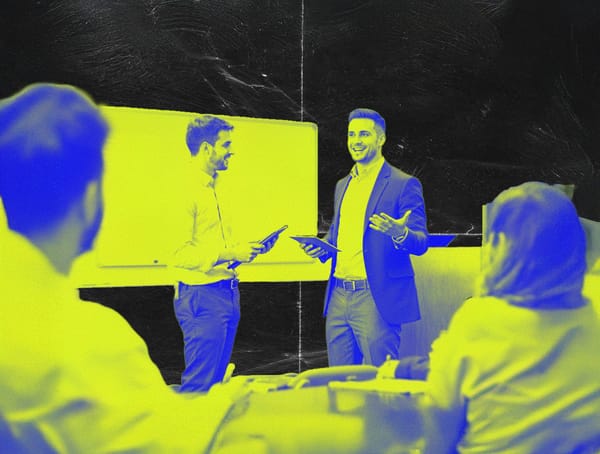How to be anti-disciplinary [a series]
An introduction to a series exploring my path to medicine, what I've learned along the way and the experiences that have led me to a unique place in life.
![How to be anti-disciplinary [a series]](/content/images/size/w1200/2021/08/24BF5D67-E88C-4AB1-87C8-135D81867577.PNG)
I've always been drawn to tinkering and dabbling. Trying stuff out purely for the sake of trying something new. Growing up, I didn't think of myself as creative per se but always found myself gravitating to creative pursuits. I could recognize the feeling of inspiration, but I didn't entirely know what it meant when I felt it or how to generate it on demand. I often limited myself based on the "rules" of how something should be done - drawing a cartoon needed to look a certain way, editing a video had a specific prescription. What I was doing wasn't art necessarily because I wasn't an artist - I'd tell myself. Looking back, It's not surprising; it's what most people tell themselves.
Fortunately, I've kept tinkering with stuff I find interesting. I've used that as a guiding light since I was a little kid; explore what seems cool, leave it be when you're done with it. When I was in middle school, I worked on a berry farm between 7th and 8th grade. I worked something like 20 hours a week and made minimum wage - about $5.50 an hour. It was enough to buy some new electronics - the most important being a new Sony video camera. This was the era of skate and BMX videos being the pinnacle of cool. Everything I did with my friends I wanted to turn into a "skate" video. The technology was tricky to use well. You recorded onto small cassette tapes and used an RCA converter to plug the camera into the computer to create a digital file. All I can remember is the software being so confusing. I never used it. I filled tape after tape with the most mundane stuff; friends doing tricks on their skateboards, jumping off stairs into piles of pillows, pranks, poor clothing choices, odd haircuts. I wasn't alone - this was what so many other kids my age loved to do. They still do! It's obvious how YouTube has become ubiquitous.

Identity Helps Build the Foundation
In high school, I never really felt like I found "my group." Not so much in a friendship way, but really an identity. I took art classes, but no one ever called me an artist. I took science classes but never thought of myself as a scientist. I knew I wanted more than what I saw around me. I took "honors" classes but felt like they weren't a valuable use of my time, so I switched to "regular" classes. At the time, I didn't realize that the students in the "honors" courses just so happened to be counseled on ACT/SAT prep and planning to go to University.
In contrast, students in the "regular" classes met with student counselors to discuss the value of vocational education and how to attend the local technical college. In a way, my identity was crafted without my input. Without an awareness of what was happening, the suggestion by a school counselor that the local technical school was a good option for someone "like me" established my self-identity and path for me. Without having someone around show me what was possible, that void was filled by someone who didn't actually know me. I happened to be in a digital animation class I was enjoying at the time and thought that'd be cool to study. Off I went to Madison Area Technical College to study computer animation.

I really liked that first year out of high school. I was still meandering, to be sure. I didn't fully commit myself to study and definitely prioritized working (what else do you expect when a kid has been working since age 12?) I bought art supplies and learned to draw in perspective and how to shape human figures on paper. I made friends who were studying color theory and took a digital photography course. That time formed some of my best memories after high school. I realized, though, that at the end of the process, the outcome I would arrive at didn't align with what I saw for myself. I dreamed of more but wasn't sure how to make it happen or even where to start.
I started to lean back into my love of sports and interest in science. I took courses in athletic training. One day in class, an instructor was talking about the "allied health professions." They made a comment that went something like, "the difference between becoming an athletic trainer and a physician is really the length of training." Boom. Just like that, someone said the magic words that allowed me to place my identity in medicine. Until that point, it had never crossed my mind as something that was even an option. Within a month or so, I made the decision I would go to medical school.
A series to Explore What, Why, and How
I've spent a lot of time thinking about that path and what exactly led me to navigate it the way I did. At multiple points along the way, I had to decide to delay gratification, to say no to an opportunity that would create comfort today for a chance to build something better later. My path has been unique for sure, and I'm grateful for the shape it's taken. Over the next few weeks, I'm going to share the insights I've taken away, reflecting on the past couple of decades and my experiences along the way. Suppose you are someone who feels like you don't quite "fit" in the ways people try to fit you in or feel like your path or process doesn't align with "the usual way," or feel like people overlook you for others. In that case, I hope to give you the perspective I wish I had had.
anti disciplinary: someone or something that doesn't fit within traditional academic discipline-a field of study with its own particular words, frameworks, and methods - Joi Ito, MIT
Read the next post in the series here.





